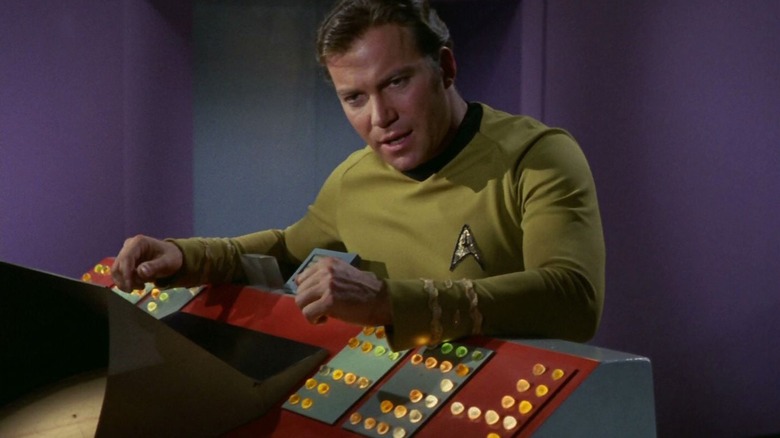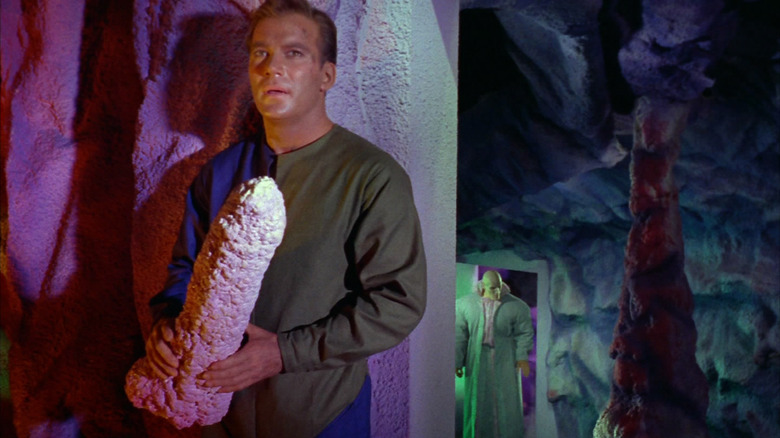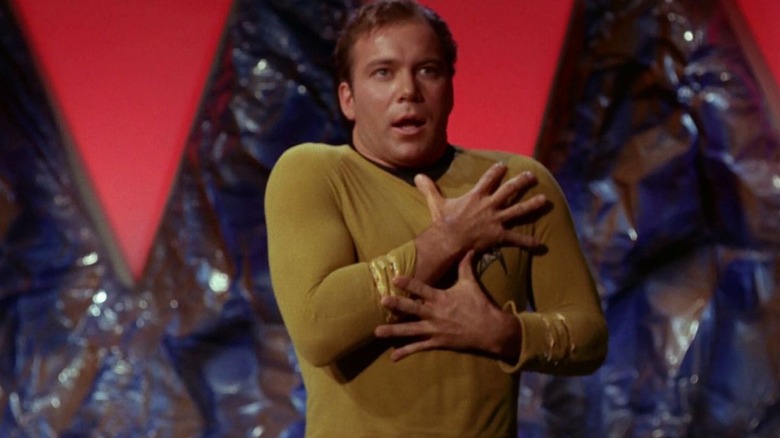William Shatner Claims Star Trek Creator, Gene Roddenberry, Would Be Turning In His Grave
It should come as no surprise to anyone that William Shatner, 91, thinks the original "Star Trek" is the best one. Shatner has, according to various rumors over the years, always felt that "Star Trek" was a three-character show — Kirk, Spock, and Dr. McCoy — with Kirk in the center. Anyone who has been to a "Trek" convention have heard stories from most of Shatner's co-stars that he was aloof on set, and that Shatner wasn't too keen on acknowledging the show's entire ensemble. He behaved "the star." One can find a spate of stories from Nichelle Nichols, or George Takei about how much they disliked Shanter for his implied insistence that he remain the very center of the galaxy.
As such, any "Star Trek" show that isn't about Kirk and doesn't star William Shatner, according to William Shatner, is the lesser "Trek." One might argue that "Trek" creator Gene Roddenberry improved on his 1966 vision when he made "Star Trek: The Next Generation" in 1987 — Roddenberry spent the '70s on the convention circuit, re-learning the lessons of the original series — but Shatner, it seems, disagrees.
Lest one assume Shatner has mellowed in his old age, one only need to open Twitter to see this is not the case. Shatner, in recent years, has grown into an outspoken, amusingly bitter figure on his Twitter account, quick with a cuss or two, and his finger poised over the "block" button. Never one to shy away from irking fans, Shatner also controversially proclaimed at the 2022 San Diego Comic Con — in via a report from the Hollywood Reporter — that newer "Trek" would be enough to outrage Roddenberry.
Really?
The panel at San Diego Comic Con was hosted by Kevin Smith, a geek elder statesman and notorious "Star Wars" fan. Shatner was entreated to give a greeting to the Starwoids in the audience, and he gleefully shouted out "F*** 'Star Wars!" before quickly amending his statement to defend Mark Hamill. Mark Hamill, he said, was alright. As he has likely been asked myriad times at many "Trek" conventions over the years, Shatner was asked if any of the new shows could match the original. Shatner answered in the resoundingly negative, saying:
"I got to know Gene Roddenberry in three years fairly well. He'd be turning in his grave at some of this stuff."
Sadly, Shatner did not elucidate further on what he meant by "some of this stuff." Given the deluge of new "Star Trek" shows on Paramount+, there is a lot of "stuff" to choose from. Shatner doesn't cite particular episodes or stories from "Star Trek: Discovery" or notions introduced in "Star Trek: Picard" as examples. He didn't even say if he bothered to watch much new "Trek." He merely waved away newer "Star Trek" as unilaterally bad.
Not watching new "Star Trek," of course, is his right. At a spry 91, it's not Shatner's job to remain the central pundit of the franchise. Another geek elder statesman, Wil Wheaton (who played Wesley Crusher on "Next Generation"), appears to have taken up that mantle, hosting "Star Trek" interview programs and after-shows on Paramount+.
Shatner's dismissal of new "Trek," though, denotes the latest flip comment on the politics of "Star Trek" that Shatner has been expressing for a while.
Issues vs. politics
It may just be a matter of semantics, but on his Twitter account in January of 2020, Shatner declared that "Star Trek," one of the more overtly political shows in sci-fi TV at the time, was not political. One of his many irked followers accused him of being a bad man, and Shatner responded by saying "Trek" was not about politics, but "social issues that many construe to be political." A drama about social issues is the very definition of political art, but Shatner feels there is a logistical difference. "How can they be political however," he Tweeted, "when the very definition of politics is governance of areas & boundaries? It would be oxymoronic."
When Shatner uses the word "politics," then, he seems to be referring very specifically to matters of governance. Roddenberry was famously pretty much a communist, and used "Trek" as a criticism of capitalism. He also used "Trek" to explore issues of racism and war, setting it in a near-utopia beyond racial and nationalist animosity. For Shatner, unless the episode was about the actual federal governing bodies of an alien planet, then the show wasn't political.
Shanter's comments, sadly, fall in line with some recent commentary from right-wing media outlets that have, in a fit of extreme misinterpretation, declared "Star Trek" has, in 2022 America, suddenly become "woke." "Trek," of course, has always presented a post-capitalism technological paradise that very much has a left-leaning political point of view. It may be a military show about rules and formality, of course, but it does not celebrate military might.
Shanter's comments on Twitter and at Comic-Con left many fans placing him in the same clueless camp as pundits on Fox News. One might find themselves assuming he has lost sight of his own show.


